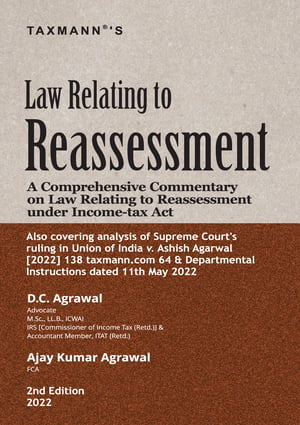- You have no items in your shopping cart
- Continue Shopping
Taxmann Law Relating to Reassessment
₹1,356Current price is: ₹1,356. Original price was: ₹1,695.
| Publisher | |
|---|---|
| Language | |
| Authors | |
| Binding Type | |
| Edition | |
| Date of Publication |
Taxmann Law Relating to Reassessment
The book is a treatise on ‘Reassessment under Income tax Act’ containing each aspect of the law. The newly substituted provisions as per Finance Act 2022 have been incorporated appropriately. This book is not only characterised by its lucid explanations but also includes 2,500+ case laws and 170+ FAQs for the removal of doubts and to explain the issues further.
Taxmann Law Relating to Reassessment Description
This book is a comprehensive commentary on the Reassessment provision under the Income-tax Act. It features an exhaustive discussion on the fundamental concepts & issues arising under the law of reassessment combined with essential commentary on statutory provisions & the jurisprudence. It also includes cross-references to other chapters wherever implications must be understood entirely to assist the reader. The objectives of this book are as follows:
- [Amendments made by the Finance Act 2021 & Finance Act 2022] with respect to the provisions relating to reassessment
- [Insight into the Old Provisions] through a simple and understandable explanation
- [Condition for Deeming Provisions/Procedure] To highlight the conditions under which deeming provision of section 148 can be applied, or procedure contained in section 148A can be followed
- [Case Laws under the Old Law] To highlight to what extent propositions upheld by the Courts under the old law can be applied under the new law
- [Revision u/s 263 in Reopened Cases] To highlight the circumstances under which revision u/s 263 in reopened cases can be done
- [Penal Provisions] To highlight the circumstances under which penal provisions in relation to escaped income can be invoked.
This book will be helpful for departmental officers, litigants, and tax professionals dealing with the reopening of assessment. The provisions are explained in a manner so that not only the experts in Income-tax law will be benefited, but also a beginner can be elevated to the next level.
The Present Publication is the 2nd Edition, authored by D.C. Agrawal & Ajay Kumar Agrawal. This book is amended by the Finance Act 2022, and the law stated in this book is amended up to 12th May 2022, with the following noteworthy features:
- [FAQs] for quick answers to 170+ select questions relating to assessment/reassessment
- [Easy-to-Understand Commentary in Article Format with a focus on Implications] along with guidance on understanding the implications of the new law on reopening of completed assessments
- [2,500+ Case Laws] are included in this book
- [Understanding Concepts such as Inquiry, Jurisdiction Issues, etc.] It will be helpful to understand the new concept of inquiry before the issue of notice u/s 148 of Income-tax Act for reopening of assessment and implications and jurisdiction issues arising during its implementation
- [Scope & Limitation of ‘Deemed Information’] The new concept of deemed information contained in section 148, its scope and limitation have been explained in a lucid manner
- [Interplay of Section 149 & Deemed Information] The book also helps the reader to understand the scope and limitation of section 149 and its effect on deemed information
- [Discussions on Terms which have a Broad Interpretation] The book features a thorough discussion on the scope of expressions such as:
- ‘Suggest’
- ‘Books of Accounts’
- ‘Other Documents’
- ‘Evidence’
- ‘Asset’
- ‘Dumb Information’
- [Intricacies and Issues] arising from the implementation of the new law and their solutions
The contents of the book are as follows:
- Introduction
- Reopening under Old Law
- Income Escaping Assessment – Section 147
- Issue of Notice where Income has Escaped Assessment – Section 148
- Conducting Inquiry, providing opportunity before the issue of Notice under Section 148 – Section 148A
- Implications of Section 135A in Reopening of Assessment
- Concept and Scope of Deemed Information
- Time Limit for Notice – Section 147
- Books of Account, Other Documents & Evidence
- Issue and Service of Notice Generally
- Approval of Additional Commissioner – Section 148B
- The Sanction for Issue of Notice – Section 151
- Notice Deemed to be Valid under certain Circumstances – Sections 292B & 292BB
- Assessment and Reassessment in Search, Requisition and Survey Cases
- Revision of Reassessment Orders
- Penalties
- Glimpses of Faceless Assessment under the New Law
- Miscellaneous Escaped Income and Reopening under New Law
- Validity of Notices issues under Section 148 after 01-04-2021 under old Law
- The last chapter contains more than 170 frequently asked questions and their answers typically arising to a reader while studying the new law of reassessment
Taxmann Law Relating to Reassessment
| Publisher | |
|---|---|
| Language | |
| Authors | |
| Binding Type | |
| Edition | |
| Date of Publication |

